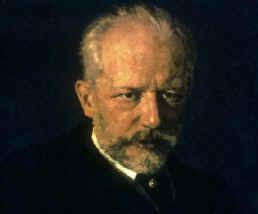|
Makers
Violin History & Timeline
PERFORMERS
Violin
Viola
Cello
Bass
Gamba, etc.
The Roots of Famous Violinists
TEACHERS
Violin
Viola
Cello
Bass
DEALERS
Listings
Specialist
Event
LUTHERIE
Bibliography
Listings
Gallery
COLLECTING
Identification
Buying
Selling
THE INSTRUMENTS
Violin
Viola
Cello
Bass
Viol
Bows
Tales
LINKS
Interesting Sites
GALLERY
Antique Instruments
Historical Photos
|
|
 Tchaikovsky
was constantly in a state of mental anguish. A hypersensitive
individual, he spent most of his life in fear and irritation. Obsessed
with strange beliefs, and ashamed of his homosexual tendencies, he often
thought that he was mad, and tried to commit suicide more than once.
This extremely sensitive individual was born in Russia on May 7, 1840.
The son of a lieutenant colonel, Tchaikovsky was the youngest of seven
children. When he was five years old, Tchaikovsky was given a few piano
lessons. However, he was not actively involved with music until the late
age of twenty-two. Tchaikovsky
was constantly in a state of mental anguish. A hypersensitive
individual, he spent most of his life in fear and irritation. Obsessed
with strange beliefs, and ashamed of his homosexual tendencies, he often
thought that he was mad, and tried to commit suicide more than once.
This extremely sensitive individual was born in Russia on May 7, 1840.
The son of a lieutenant colonel, Tchaikovsky was the youngest of seven
children. When he was five years old, Tchaikovsky was given a few piano
lessons. However, he was not actively involved with music until the late
age of twenty-two.
Law was the field of study that Tchaikovsky initially
pursued. He became a clerk in the Ministry of Justice, but found that
the position did not interest him. Lacking focus, Tchaikovsky did not
develop his Legal skills. However, he soon found that music had the
power to motivate and invigorate him. He began to study the piano and
music theory, and he enrolled in the Russian Conservatory. His primary
instructor, Nicholas Zaremba, proved to be a wonderful source of
inspiration, and encouraged Tchaikovsky to build a career around music.
Tchaikovsky became completely absorbed in the writing
of compositions, and his initial works were performed at student
concerts at the Conservatory. His cantata, Ode to Joy, won him
great recognition, as well as a silver medal. After graduating,
Tchaikovsky was offered a position at the Moscow Conservatory, where he
became a professor of harmony. Working on his first major composition,
his First Symphony, became a tremendous ordeal. Tchaikovsky suffered
from a nervous breakdown, and continually thought he would die before
the piece was completed. He was unable to sleep, and had to take time
off from the Conservatory to recooperate in the country. The following
year he was able to complete the symphony, and its premiere was
tremendously successful. In 1870 Tchaikovsky wrote Romeo and Juliet, his
first masterpiece. Although the work did not initially meet with great
approval, Romeo and Juliet became
one of Tchaikovsky’s most popular compositions after it was revised.
Terrified of his homosexual tendencies, and yearning
to convince his family and fans that he was not gay, Tchaikovsky married
Antonina Miliukova. Antonina was entirely devoted to him, and agreed to
wed Tchaikovsky despite the open assertion that he would never love her.
Their marriage was a disaster, as Tchaikovsky refused to go home to her
at night, and would walk the streets of Moscow in the dark. Tchaikovsky
became extremely depressed, and attempted suicide at this time. He
simply could not relate to Antonina, and desperately wanted to escape
from their marriage. Trying to avoid his wife completely, Tchaikovsky
traveled throughout Europe for a year. He was never reunited with
Antonia, although she spent many years pestering his relatives for
money, and threatening to blackmail him. Eventually, Antonia was put
into an insane asylum.
There was one woman in Tchaikovsky’s life who did
provide him with tremendous emotional and financial support. Madame von
Meck, a wealthy widow, constantly corresponded with Tchaikovsky via
mail. She and the composer wrote to one another daily, however, they
never met. Madame von Meck chose to keep Tchaikovsky at a distance, but
she willingly subsidized his musical excursions. Their
relationship continued for thirteen years, and allowed Tchaikovsky
a level of financial independence. He was able to produce some of his
finest pieces during this time.
Sadly, Madame von Meck suddenly terminated her
relationship with Tchaikovsky by falsely claiming that she was no longer
financially stable, and could not support him. By this point, the
success of his works was providing Tchaikovsky with adequate financial
stability. Unconcerned with the loss of money, Tchaikovsky wanted to
hold onto Madame von Meck’ s friendship and affection. He wrote to her
constantly, however, she never responded to his correspondence again. It
is believed that family pressure made Madame von Meck forsake her
relationship with Tchaikovsky.
Tchaikovsky continued to tour, and went to America
where he celebrated the opening of Carnegie Hall by conducting his 1812
Overture. Although he loved the American culture, he was plagued by
a constant sense of dissatisfaction and loss. He returned to Russia, and
in 1893 and contracted cholera. In a delirious state, he constantly
called out Madame von Meek’s name, revealing his longing for her
support and friendship. Madame von Meek passed away merely three months
after Tchaikovsky died. Thus, it seems that neither individual could
survive without the acceptance and affection of the other.
While Tchaikovsky’s morbid fears and madness passed
away, the perfection and beauty of his masterpieces withstand the test
of time. The composer of Swan Lake, Sleeping Beauty, and The
Nutcracker, Tchaikovsky wrote pieces that resonate with harmony and
grace. His works continue to be celebrated and embraced throughout the
world.
Note by Shanaira Udwadia (Aug-2001)
|